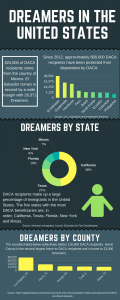
Rescission of DACA program impacts students at UHCL
President Donald Trump announced his decision to rescind the Deferred Action for Childhood Arrivals (DACA) program, an executive order created by former President Obama, that protects undocumented immigrants brought to the U.S. as children. UHCL is offering DACA students resources and tools to help navigate the new policy.
“University of Houston-Clear Lake supports education for all students and is concerned about the current action regarding the DACA program,” said UHCL President Ira K. Blake, in a university-wide email Sept. 6. “We believe all who aspire to higher education should be permitted to access the tools necessary to reach their goals. Joining with the other UH System universities, UHCL will actively support all students through any means allowed by the law. As part of the UH System, we are committed to working with national higher education organizations and Congressional leaders to find a solution.”
On Sept. 5, Trump called the DACA program a temporary fix to America’s immigration problem in his press release.
“The temporary implementation of DACA by the Obama Administration, after Congress repeatedly rejected this amnesty-first approach, also helped spur a humanitarian crisis – the massive surge of unaccompanied minors from Central America including, in some cases, young people who would become members of violent gangs throughout our country, such as MS-13,” said President Trump. “Only by the reliable enforcement of immigration law can we produce safe communities, a robust middle class and economic fairness for all Americans.”
Attorney General Jeff Sessions also called the DACA program an unconstitutional use of executive power, so over the next six-months the lives of the DACA recipients will be debated in Congress in hopes of creating immigration reform. But, by March 2018 the program is scheduled to be phased out. This will affect 800,000 dreamers across the nation, and more than 240,000 in the state of Texas. These individuals were brought to the U.S. as children, and the majority are now young adults serving in the military, working and/or attending college.
“DACA students I have spoken to at UHCL are stressed, worried about the uncertainty of their college and professional futures, and dealing with the unfair burden of navigating an uncertain system while trying to complete a degree,” said Erika Garcia, coordinator for diversity programs.
Garcia said the average student’s schedule is stressful because they study for classes, spend time with family members and friends, participate in extracurricular actives and some are also employed. DACA students carry the same responsibilities, but also the weight of the recent policy change.
“On top of all of that, add the magnitude of stress that accompanies not having the security that you will remain in the U.S., the country where you have built an entire life, where all the above-mentioned components and the relationships you have formed exist and you are being asked to leave – seemingly permanently. I personally think it is an incredibly scary situation that most of us cannot even begin to understand or identify with,” said Garcia.
Garcia, an advocate for students, has opened her office to those that want to share their experiences and struggles.
The University of Houston System, including UHCL, does not check the citizenship status of students when enrolling into the university, and under FERPA (or Family Educational Rights and Privacy Act) schools are prohibited from releasing material that could expose students legal status.
The University of Houston System has various resources available to students attending any of the campuses. University of Houston-Main campus is offering resources at the University of Houston-Law Center with Immigration Clinics, scholarship opportunities on the Urban Experience Program website, a blog, “My Undocumented Life,” that offers up to date information, and chances to advocate with the Y.E.A. (Youth Empowerment Alliance) organization.
“Right now, the movement is all hands-on deck,” said Uyiosa Elegon, communications lead for the Youth Empowerment Alliance. “Diversity is a University of Houston [System] value that must be upheld by students, faculty, and staff in this test of time. Undocumented students need help from citizen allies more than ever to push their representatives to pass a clean DREAM Act that keeps our communities thriving. There are plenty of in-house policies that students and faculty can get connected to. Join us!”

On UHCL campus, David Rachita, dean of students, and Iliana Melendez, associate dean of students, are working with the University of Houston-Main campus on developing a letter that will include a frequently asked questions section to help provide resource information to the UHCL student body.
“Obviously, the university will abide by the law while also caring and supporting [UHCL] students who will potentially be affected,” said Rachita. “We are here to support our students anyway we can.”
There are also off-campus resources that help assist DACA recipients. The Houston office of United We Dream offers free DACA services.
“United We Dream Houston is an undocumented youth led-organization,” said Chris Valdez, member of United We Dream Houston. “We connect undocumented people to available resources to excel in our communities, and advocate to end anti-immigrant policies at the local, state and national levels.”
They aid with DACA renewals, fees and have weekly meetings, check their schedule for locations, Thursdays, at 7 p.m.
